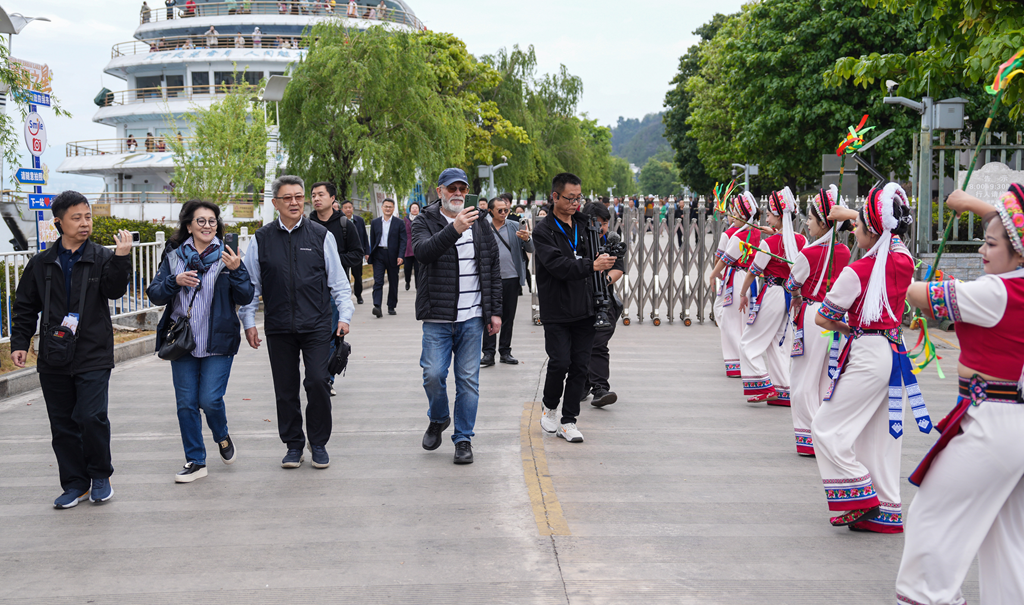Exploring colorful Yunnan, discovering China’s beauty
From breathtaking natural scenery and delectable local cuisines to vibrant ethnic customs, Yunnan recently captivated nearly 20 foreign diplomats and international organization officials. They participated in the “2025 ‘Discover China Cultural Tour’ of Yunnan for Diplomats in China” event, held in Dali Bai Autonomous Prefecture and Lijiang City. The experience allowed them to personally immerse themselves in Yunnan’s many-splendored life, leaving a profound impression and generating enthusiastic expectations.

The foreign diplomats and international organization officials admire a Bai dance in west Yunnan's Dali Bai Autonomous Prefecture.
Splendid landscapes and rich culture
Renowned for its breathtaking landscapes, Yunnan has been a highly sought-after destination throughout history. During the Ming Dynasty (1368–1644), the celebrated traveler Xu Xiake resided in Yunnan for nearly two years. His extensive travelogue, Xu Xiake’ s Travels, features a 250,000-character section titled Travels in Yunnan, which vividly describes the province’s beautiful scenery. He writes of “peach blossoms floating on streams, seemingly beyond the human world, with cloud shadows and moss traces forming the passage of time.”
Foreign diplomats and officials from international organizations toured iconic sites such as the Three Pagodas of Chongsheng Temple, the Erhai Lake Ecological Corridor, Dali Ancient City, Yulong Snow Mountain, and Lijiang Old Town throughout the event. Witnessing diverse ethnic performances and experiencing hands-on intangible cultural heritage and handicraft making, they were deeply impressed and captivated by Yunnan’s history, culture, natural beauty, and local traditions.
More than just an emblematic landmark of Dali, the Three Pagodas of Chongsheng Temple offer a profound glimpse into Yunnan’s ancient history and culture. Under the guidance of a local Bai tour guide, international officials strolled through the venerable architectural complex. With ancient cypresses standing robust and greenery abounding, everyone enthusiastically raised their phones to capture the beautiful spring vista of the Three Pagodas.
At the Erhai Lake Ecological Corridor, gentle ripples graced Erhai Lake’s surface, while weeping willows swayed gracefully. Charming Bai ethnic residences, with their distinctive black tiles and white walls, were beautifully nestled amidst the verdant waters and lush mountains. The international officials were visibly captivated, embracing the unique local leisure and tranquility of the area.
At Dali Port Pier, the international officials boarded an Erhai Lake cruise ship. As they sailed, they not only savored the magnificent vistas of Cangshan Mountain and Erhai Lake but also delighted in a lively Bai ethnic song and dance performance. Their experience was further enhanced by a tasting of the traditional Bai Three-Course Tea, offering a rich immersion into the region’s distinctive ethnic customs.
“This is my first time in Dali, and it’s a beautiful, clean, and people-friendly place,” remarked Nyamma Enkhbold, the Mongolian Ambassador to China. He further noted that Yunnan showcased an excellent balance between ecological protection and tourism development, a success particularly evident with Erhai Lake right before his eyes. Mr. Enkhbold added, “I believe that with continued protection and development, Dali will become one of the most attractive tourist cities in the future.”
Upon visiting the Mu Family Mansion, international officials were deeply impressed, marveling at how this “chieftain residence” encapsulates “half the history of an ethnic group.” This magnificent complex, once the residence and yamen of the Lijiang Mu chieftains, has undergone extensive expansions and renovations over time. Its grand layout follows a central axis, featuring prominent structures like the Deliberation Hall and the Hall of Ten Thousand Scrolls. By seamlessly incorporating architectural styles of both the Naxi and Bai ethnic groups, it stands as a tangible record of cultural integration.
In ancient times, Lijiang prospered through trade and business travel. Now, with the sound of horse hooves a distant memory, Lijiang thrives because of cultural tourism. Nguyen Truong Son, first secretary at the Vietnamese Embassy in China, walked, listened, observed, and posed questions. “Protection and development are advancing in synergy here, tradition and modernity blend, and Yunnan’s tourism development has achieved remarkable results,” he said. “I believe that as cultural tourism continues to mature, it will undoubtedly enhance the well-being of both local communities and visitors.”

The foreign diplomats and international organization officials take a selfie in northwest Yunnan's Lijiang City.
Colorful Yunnan entices travelers
In recent years, Yunnan’s tourism appeal has steadily increased, significantly expanding its global recognition. Within the province, numerous hidden gem towns and vibrant rural areas are emerging as highly sought-after destinations for a growing number of international tourists. Indeed, statistics from the first quarter of this year reveal Yunnan Province welcomed 1.8699 million inbound tourists, of whom 932,400 were overnight visitors — a remarkable 77.9% year-on-year increase. Notably, inbound overnight visitors from countries such as Switzerland, South Korea, New Zealand, and Malaysia all more than doubled.
“Dali has left a very positive impression on me; I’ve already recommended it to my family,” said Djauhari Oratmangun, the Indonesian Ambassador to China. He added that participating in the event deepened his understanding of both China and Yunnan. “Strolling through Dali Ancient City, I couldn’t help but be reminded of Jakarta, my homeland, which is also an ancient place where cultures blend,” he shared. “This experience further affirmed my belief that travel is not just about movement, but about discovering oneself and each other.” Looking ahead, he expressed hope that ASEAN and China would strengthen cooperation and share experiences in sustainable tourism, aligning these efforts with the United Nations Sustainable Development Goals. Furthermore, he suggested establishing a social media influencer exchange platform between China and ASEAN to leverage digital influence in tourism promotion and to jointly develop multi-country itineraries.
Yunnan’s beautiful scenery is increasingly being shared globally. Bolstered by the expansion and increased frequency of international and regional flights, along with the implementation of various visa-free policies and streamlined customs clearance, Yunnan has emerged as a premier tourist destination. It now attracts a growing number of foreign visitors eager to appreciate China’s stunning landscapes and immerse themselves in its rich culture. Since the beginning of this year, Dali has, in turn, established direct international and regional air routes to Kuala Lumpur, Hanoi, Singapore, Bangkok, and Ho Chi Minh City, significantly advancing the internationalization of its tourism industry.
“Having visited Lijiang many times, I have always found that its tourism strikes a commendable balance between heritage preservation and development, a quality truly appreciated by Malaysian tourists,” said Muhammad Akma bin Abdul Wahab, the Malaysian Consul General in Kunming. He added that Malaysia and China, particularly Malaysia and Yunnan, possess valuable tourism development models from which both can learn. He expressed his hope that more Chinese and Yunnan tourists would visit Malaysia to immerse themselves in its unique cuisine and distinctive cultural tours.
“China has experienced rapid development in recent years, achieving significant accomplishments across various sectors,” stated Kim Tongbom (transliteration), Minister of the Embassy of the Democratic People’s Republic of Korea in China. He emphasized, “Tourism plays a vital role in strengthening international exchanges and fostering people-to-people friendship. Coming to China in person, to travel and see for oneself, makes it much easier to truly understand the country.”
Text by Zhu Hai and Mo Yingyi
Translated by YNTA
Proofreading by Zu Hongbing